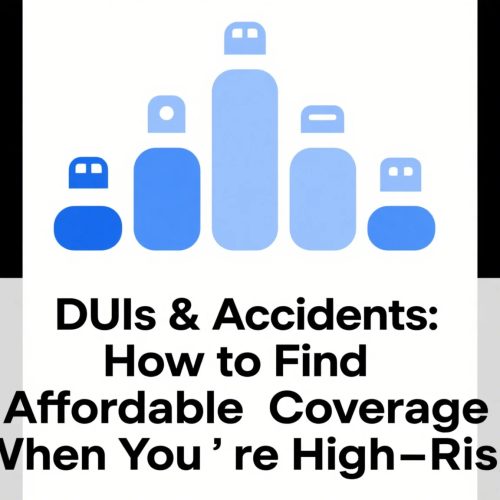part 1:
If you’ve been charged with a DUI (Driving Under the Influence) or involved in a serious car accident, your life has likely been turned upside down. Beyond the legal and financial repercussions, finding affordable car insurance can feel like an insurmountable challenge. High-risk drivers, such as those with a DUI conviction or a history of accidents, often face higher premiums, limited coverage options, or even difficulty finding a provider willing to take them on.

Understanding the impact of a DUI or accident on your insurance rates is the first step toward finding a solution. Insurance companies classify drivers based on risk factors, and a DUI or accident significantly elevates your risk profile. This means you’re likely to be labeled a “high-risk” driver, which can lead to higher premiums, shorter policy terms, or even a complete refusal of coverage.
But the good news is that there are options available for high-risk drivers. While the process may be more involved than for low-risk drivers, it’s not impossible to find affordable car insurance after a DUI or accident. Here’s how you can navigate this challenging landscape:
1. Understand Your Insurance Requirements
After a DUI or accident, you may be required to file an SR-22 form with your state’s Department of Motor Vehicles (DMV). This form, also known as a Certificate of Financial Responsibility, proves that you can afford to pay for the financial damages you might cause while driving. Some states require an SR-22 for a period of three years after the conviction or accident.
Not all insurance companies offer SR-22 insurance, so it’s crucial to shop around for a provider that specializes in high-risk drivers. These providers may charge higher premiums, but they can be your best bet if you’re required to file an SR-22.
2. Shop Around for High-Risk Insurance Providers
Traditional insurance companies may not be willing to cover high-risk drivers, so you’ll need to explore specialized providers. Many insurance brokers or agents have relationships with high-risk carriers and can help you find a policy that fits your needs.
When shopping for insurance, compare quotes from multiple providers to find the best rate. Be honest about your driving history, as failing to disclose a DUI or accident can lead to policy cancellation or legal trouble down the line.
3. Consider Alternative Coverage Options
If you’re struggling to find affordable coverage, consider alternative options such as:
Pay-As-You-Go Insurance: This type of insurance charges you based on how often you drive, which can be more affordable for low-mileage drivers.
Liability-Only Insurance: If your vehicle is older or you don’t drive frequently, liability-only coverage may be a more affordable option. This covers damages to others but not to your own vehicle.
Non-Owner Policies: If you don’t own a car but still need coverage for occasional use, a non-owner policy might be an option.
4. Improve Your Driving Record
While you’re working on finding affordable coverage, take steps to improve your driving record. This can include:
Completing a DUI education program or driver’s education course.
Avoiding any new traffic violations or incidents that could further increase your risk profile.
Practicing defensive driving to reduce the chances of accidents.
Improving your driving habits can help you transition back to standard insurance rates over time.
part 2:
5. Explore State-Sponsored Programs
Some states offer special programs for high-risk drivers, such as Graduated Driver Licensing (GDL) programs or insurance initiatives for those with DUIs. These programs are designed to help drivers rebuild their records and access affordable coverage.
Check with your local DMV or insurance regulator to see if such programs are available in your area. These programs may require you to complete specific courses, maintain a clean driving record, or meet other criteria to qualify.
6. Budget for Higher Premiums
Unfortunately, high-risk drivers often face significantly higher premiums than their low-risk counterparts. While this can be discouraging, it’s important to budget for these costs and prioritize insurance as a necessary expense.
If money is tight, consider reducing your coverage to the minimum legally required or opting for a higher deductible. While this may leave you with less protection in the event of an accident, it can make insurance more affordable in the short term.
7. Seek Professional Help
Navigating the complexities of high-risk insurance can be overwhelming, especially if you’re already dealing with the aftermath of a DUI or accident. Consider consulting with an insurance broker or attorney who specializes in high-risk cases.
These professionals can guide you through the process, help you find the best coverage options, and ensure that you’re complying with all legal requirements.
8. Be Patient and Persistent
Rebuilding your reputation as a responsible driver takes time. Don’t be discouraged if the road to affordable insurance is long and difficult. Keep track of your progress, stay compliant with any legal requirements, and continue to improve your driving habits.
Over time, as you demonstrate your commitment to safe driving, you may be able to transition to standard insurance rates. This process can take several years, but it’s well worth the effort.
Final Thoughts
A DUI or serious car accident can have far-reaching consequences, including difficulty finding affordable car insurance. However, with the right approach and persistence, you can overcome these challenges and secure the coverage you need. By understanding your requirements, shopping around for the best rates, and taking steps to improve your driving record, you can navigate this difficult situation and get back on the road.
Remember, you’re not alone in this journey. With determination and the right resources, you can find affordable car insurance and work toward a brighter future.
This concludes the article. Let me know if you need further adjustments or additional content!
